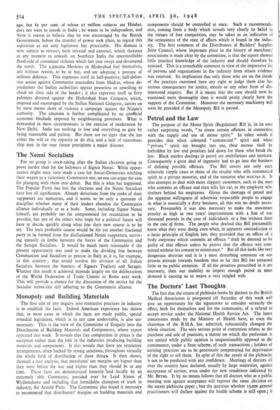Monopoly and Building Materials
The first aim of any inquiry into restrictive practices in industry is to establish the facts. Indeed American experience has shown that, in most cases in which the facts are made public, special remedial legislation, which is in any case undesirable, is also un- necessary. This is the view of the Committee of Enquiry into the Distribution of Building Materials and Components, whose report appeared this week. It reveals that free competition in prices is the exception rather than the rule in the industries producing building materials and components. It also reveals that there are restrictive arrangements, often backed by strong sanctions, throughout virtually the whole field of distribution of these thing% It then shows, through a cost analysis, that merchants' net margins are higner than they were before the war and higher than they should be at any time. These facts are demonstrated honestly 'and lucidly by art extremely able Committee, presided over by Lord Simon of Wythenshawe and including that formidable champion of truth in industry, Sir Arnold Plant. The Committee also found it necessary to recommend that distributors' margins on building materials and components should be controlled at once. Such a recommenda- tion, coming from a body which reveals very clearly its belief in the virtues of free competition, may be taken as an indication of . the seriousness of the state of affairs whieh it found in the indus- try. The first comment of the Distributors of Builders' Supplies Joint Council, whose important place in the history of merchants' associations is made clear by the committee, is that the report showed little practical knowledge of the industry and should therefore be rejected. This is a remarkable comment in view of the impressive list of persons and organisations in the industry from whom evidence was received. Its implication that only those who are on the inside of the practices examined have any right to iudge them also has serious consequences for justice, morals or any other form of dis- interested enquiry. But if it means that the case should now be examined more thoroughly then it would pretty clearly have the support of the Committee. Moreover the necessary machinery will soon be provided if the Monopoly Bill is passed.






























 Previous page
Previous page